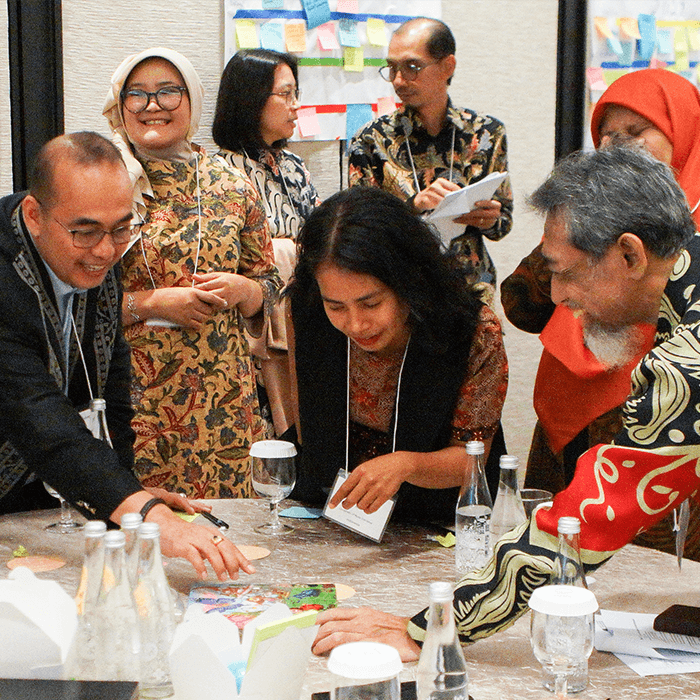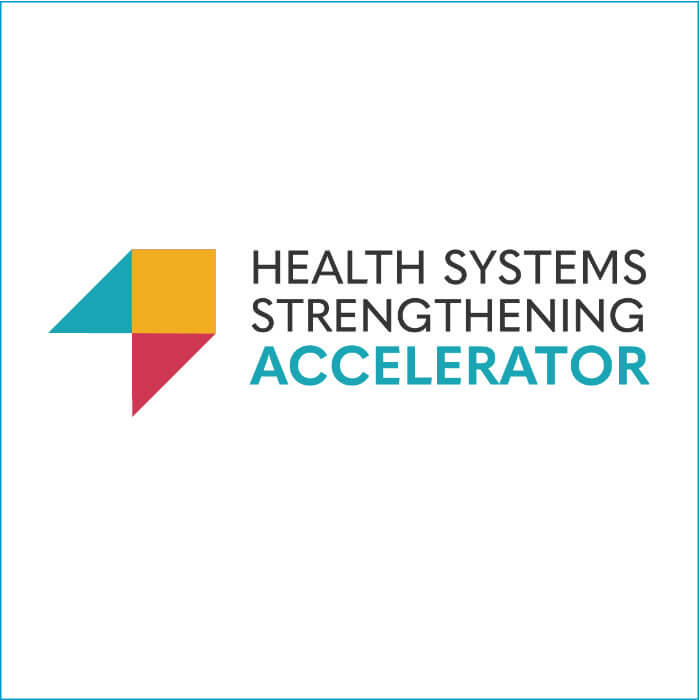Challenges in Health Systems Strengthening
Over the past few decades, the health and well-being of people have improved in many places across the globe. This progress has been possible in part because of successful investments that have enhanced countries’ health system performance.
While these advances are promising, progress toward strong, self-sustaining health systems remains too slow, and the COVID-19 pandemic has created many setbacks. As a result, many people are being left behind. To reach the goal of ensuring healthy lives and promoting well-being for all, country leaders need new approaches that will enable them to build stronger, more sustainable health systems faster.
The Opportunity to Accelerate Progress toward Universal Health Coverage
Accelerating progress toward self-sustaining, high-performing health systems is possible. To achieve this, countries and development partners must meet complex, systemic challenges with dynamic and innovative solutions that are adapted to meet countries’ needs and evolve over time. They must also develop new partnership models in which technical institutions and experts at regional and country levels play a lead role in driving health system innovation and improvement.
The Accelerator’s Work
The Accelerator supports country leaders as they co-create, innovate, and adapt to build more effective and sustainable health system interventions. Our innovative systems-strengthening approaches are advancing progress by:
- Scaling up primary care networks that increase access and improve the quality of primary health care
- Improving national-level and decentralized health policy and governance
- Innovating in the use of social accountability and behavior change approaches to advance universal health coverage
- Promoting the professionalization of community health workforces as a vital part of improving primary health care
- Improving sustainable health financing and strategic purchasing, including for under-prioritized programs such as rehabilitative care
The Accelerator’s Approach to Health System Strengthening
The Accelerator facilitates work with change agents from across sectors – government officials, local and regional technical organizations, and community leaders – to identify the most pressing systemic issues, diagnose their root causes, and draw upon regional and global experience to co-create innovative solutions that are adapted to suit the local context.
The program’s flexible approach focuses on supporting local partners as they articulate their goals, lead implementation, and navigate a path to meaningful and lasting health systems change. In addition to traditional technical assistance, the program mobilizes a mix of techniques to ensure that interventions are rooted in the reality of the country context, tailored to promote institutionalization, and owned by relevant local stakeholders.
The Health Systems Strengthening Accelerator follows four principles:
- Ensure that priorities are set by local change agents and work through country-led processes
- Coach rather than do: support local teams to select, design, and implement contextually appropriate solutions
- Co-create and innovate based on evidence and learning drawn from across multiple geographies
- Support adaptive learning and implementation research for evidence-based policymaking and program implementation
Where the Accelerator Works
The Accelerator partners with USAID Missions, country leaders, and local and regional partners in Armenia, Benin, Côte d’Ivoire, Ethiopia, Georgia, Ghana, Guinea, India, Indonesia, Liberia, Malawi, Mauritania, Namibia, Nepal, Philippines, Rwanda, South Africa, Tanzania, Togo and several additional countries in an Asia regional partnership—all in cooperation with USAID’s Bureau for Global Health; Bureau for Development, and Innovation; Africa Bureau; and Asia Bureau. Our work includes:
’s Country-based Work
The Accelerator is working closely with the Ministry of Health to improve community health governance in Côte d’Ivoire. With the Accelerator’s support, the country has developed its first national community health policy, an operational plan for implementing the policy, and a community health resource mapping tool that facilitates evidence-based decision-making and resource allocation.
In addition, the Accelerator is supporting Côte d’Ivoire’s UHC efforts by costing and integrating key interventions into the nation’s UHC strategy. The team is producing costing scenarios for priority maternal, child, and reproductive health services as well as other community health services; supporting advocacy for greater investment in community-based primary health care; and preparing a roadmap for harmonizing existing fragmented health financing programs into a unified UHC program.
Health System Strengthening in Ghana
Recognized as a leader in advancing universal health coverage in sub-Saharan Africa, Ghana developed its UHC roadmap in 2019. The Accelerator’s work in Ghana supports key health actors in realizing the UHC roadmap to achieve Ghana’s goal of health for all. The Accelerator has provided responsive support, following the lead of our Ghanaian partners, to help strengthen existing capacities, processes, and institutions, including:
- Supporting the Ghana Health Service to design, implement and scale up primary care Networks of Practice and to use implementation research to ensure effectiveness and equity of that scale-up
- Supporting the National Health Insurance Authority (NHIA) to become a more strategic purchaser of healthcare
- Supporting Ghana’s Ministry of Health as they lead an evidence-based process of refining, updating, and disseminating the “essential universal services” in the UHC roadmap
- Strengthening the capacity of the Health Facilities Regulatory Agency (HeFRA) to ensure quality of primary health care
- Strengthening overall health sector capacity and stewardship to drive health systems change
In 2024, the Ghana Health Service launched implementation guidelines for the primary care Networks of Practice. The guidance provides a step-by-step process for health system stakeholders to operationalize the NoP initiative, a significant milestone in building a long term primary care model in Ghana.
Health System Strengthening in Guinea
The Accelerator has partnered with a local civil society organization – Comité Jeunes Mon Avenir d’Abord (My Future First Youth Committee or CJMAD) to improve community health system performance in Guinea. The partnership is helping to strengthen leadership, governance, accountability, and management of the community health program, supporting increased and sustained financing for community health, and improving coordination between the government, civil society, donors and implementing partners, and strengthening the role of community health workers and community-based organizations in improving routine immunization coverage among children under five years of age. identify best practices and apply them to decision-making and implementation for improved community health.
Health System Strengthening in Liberia
Liberia’s largest tertiary hospital, John F. Kennedy Medical Center (JFKMC), serves over three million people and plays a vital role in the country’s health system. JFKMC requested support from USAID to address challenges in the facility’s financial, service delivery and supply chain management systems. The Accelerator is working with hospital leadership to diagnose root causes of weaknesses and co-create actions to address them. The Accelerator has leveraged regional and international health system strengthening experts to coach an implementation team at the hospital to improve management capacity, drive sustainable systems improvement, and increase multi-sectoral collaborations and cross-learning.
Health System Strengthening in Togo
Togo’s goal of achieving UHC is reflected in multiple policies, including the National Health Development Plan and an ambitious health roadmap developed in 2020. However, significant challenges remain — including limited access to essential services, lack of sustainable financing, and weak civil society engagement. In collaboration with multiple UHC stakeholders in Togo, the Accelerator, with partner Centre de Recherche en Reproduction Humaine et en Démographie (Center for Research on Human Reproduction and Demography or CERRHUD), has supported the development and implementation of a plan to strengthen specific UHC efforts, including family planning and maternal and neonatal health services, civil society capacity and engagement in UHC decision making, sustainable domestic financing for HIV, and regional and cross-country peer learning and knowledge translation to highlight best practices.
The Accelerator’s Global and Regional Work
Strengthening the Health Policy and Systems Research Ecosystem in Asia
Countries continue to seek opportunities to exchange knowledge with local, regional, and global peers to bring more evidence to health policy decision-making and implementation. Health policy and systems research institutions (HPSRIs) can contribute essential research to these knowledge-sharing ecosystems, but if engagement between HPSRIs and decision-makers is limited and evidence is not effectively translated for implementation, their ability to inform health policy dialogue and systems change is hindered. The Accelerator identified and assessed 97 HPSRIs in 27 countries across Asia and has supported the development of a Collaborative Learning Network of HPSRIs supported by USAID’s Asia Bureau. This network is helping to reduce the gap between generating evidence and translating it into health policy and implementation. Learn more about the Accelerator’s work strengthening health policy and systems research capacities in Asia.
Improving Equity and Resiliency of the Future Community Health Workforce
Health sector leaders increasingly see the first-line providers broadly categorized as Community Health Workers (CHWs) as having an integral, and no longer peripheral, role within the healthcare system. CHWs deliver a wide range of essential health services to hard-to-reach communities, and there is growing awareness of the critical role of CHWs in providing a broad range of health services for maternal and child health and the management of infectious diseases such as COVID-19. The Accelerator is utilizing evidence to explore and inform countries’ work on CHW policies and create opportunities for peer learning and knowledge exchange across countries.
Rehabilitation in post-conflict countries
Rehabilitation is essential to optimal function and quality of life, and demand for these services is increasing. One-third of the world’s population lives with a health condition that can benefit from rehabilitation services over the course of the disease or condition. The momentum for strengthening rehabilitation as an essential health service is growing, but rehabilitation is still vastly under-prioritized in national health systems, especially in low- and middle-income countries. The Accelerator is working with the World Health Organization and other partners to create global evidence and practical guidance on how to promote the integration of rehabilitation in national health systems and strengthen health systems functions for rehabilitation. The Accelerator is also working with the governments of Georgia and Ethiopia to translate the guidance into country-specific initiatives that promote high-quality and equitable rehabilitation services through sustainable financing and strong governance systems.
In collaboration with the Accelerator, the World Health Organization published the first ever WHO resource on health financing for rehabilitation. It considers financing challenges and opportunities and offers guidance for decision-makers working to strengthen rehabilitation services within health systems. Learn more about Georgia’s journey to integrating rehabilitation services into the health system with support from the Accelerator.
Safe blood systems for maternal health
Postpartum hemorrhage system-strengthening approach to supporting national safe blood services in Liberia, Malawi, and Rwanda. Using the USAID Safe Blood Starter Kit, the program is helping to identify challenges and opportunities for blood system reform, developing and implementing technical assistance around key challenges and opportunities, and facilitating cross-country knowledge exchange.
Across all of its work, the Accelerator documents and shares lessons about health system strengthening and amplifies the stories and voices of the change agents who are leading the way.
Learn more about the Accelerator’s work around the globe.
Relevant Links
















